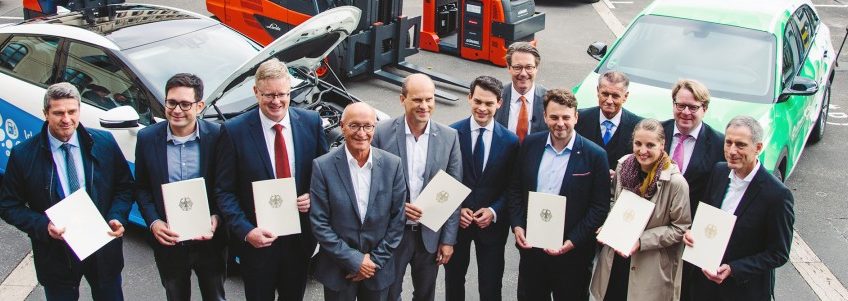Hydrogen mobility is really being brought to life: Andreas Scheuer, Federal Minister of Transport and Digital Infrastructure, today presented so-called "cheques for the future" in Berlin, amounting to a total of some 23.5 million euros. The range of funded projects spans from forklifts to equipping a ride pooling fleet through to developing a hydrogen bus and a fuel cell-powered road sweeper.
The funding support is part of the National Innovation Programme Hydrogen and Fuel Cell Technology (NIP), with which the Federal Government has been investing in research and development since 2006. The programme is designed to support the initial products required for market activation in various areas of application.
The following projects have received a cheque for the future:
CleverShuttle
CleverShuttle offers RidePooling services in Berlin, Hamburg, Munich, Stuttgart, Frankfurt, Dresden, Kiel and Leipzig using battery-electric or hydrogen-powered vehicles, thus making a contribution to sustainable, modern mobility. CleverShuttle has received funds from the procurement funding programme for the purchase of a total of 50 vehicles.
Funding amount: €754,622
Streetscooter
DHL Express and commercial electric vehicle manufacturer StreetScooter will work together to develop a new electric delivery vehicle. The new “H2 Panel Van” will be the first series production 4.25 tonne electric van, which is additionally powered by a fuel cell while on the move, and can therefore achieve ranges of up to 500 kilometres. As a first step, DHL Express has ordered 100 of these fuel cell vehicles, delivery of which is scheduled to start in 2020 and be completed in 2021.
Funding amount: €9,822,330
Trucks: MAN & Shell
Hydrogen technology is also a potential solution for emission-free heavy-duty vehicles of the future. MAN is therefore developing a long-distance fuel cell truck together with its partners Anleg and TU Braunschweig. MAN is responsible for the overall vehicle structure, the integration of the fuel cell systems and the electric drive. The hydrogen storage system is being developed by Anleg GmbH from Wesel, Germany. The TU Braunschweig supports the design of the thermal management and the operating strategy. Shell develops the associated infrastructure with a focus on a scalable compressed hydrogen filling station solution. As part of the project, the partners will examine to what extent the refuelling of heavy-duty vehicles on the basis of 500 bar represents a viable compromise between range and costs for infrastructure and the provision of hydrogen as an alternative to the more complex 700-bar passenger car technology. The aim of the project is to test hydrogen as a possible alternative to diesel fuel in long-distance transport. The project has close ties with the European PRHYDE project for the development of hydrogen filling protocols for heavy-duty applications and other activities in the field of standardisation.
Funding amount: €8,121,251
FAUN: Waste disposal vehicles
The project will develop and manufacture a waste collection vehicle and a street sweeper with a modular system of hydrogen tanks and fuel cells with the aim of increasing the range and/or improving the speed profile. The waste collection vehicles to be electrified by Faun can be equipped with the modular system ex works or at a later stage during the lifetime of the vehicle. Both prototypes are intended to test and confirm the design and feasibility of the planned energy supply system and to achieve the necessary approvals in accordance with road transport regulations. Field test vehicles have already been sold to customers. Ten waste collection vehicles and two sweepers are planned.
Funding amount: €521,241
Public transport: EvoBus/Daimler
The ECell-Rex project aims to develop a fuel cell range extender for battery-powered city buses.
Funding amount: €3,309,652
Günsel Fördertechnik und Fahrzeugbau GmbH
Procurement of 89 hydrogen-powered material handling vehicles for intralogistics at the BMW plant in Leipzig.
Funding amount: €1,024,094

